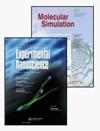混合聚乙烯变形行为的分子动力学模拟
IF 2
4区 化学
Q4 CHEMISTRY, PHYSICAL
引用次数: 0
摘要
摘要采用分子动力学方法研究了共混聚乙烯(PE)的拉伸变形行为。在统一原子模型的基础上,通过共混不同分子量的线性链对共混聚乙烯进行建模。研究了混合聚乙烯在不同应变速率和温度下的力学响应和微观构象行为。原子间能演化与应力-应变曲线相似,表明随着高分子量链分数的增加,共混PE的刚度增加。与自由体积、取向、缠结和结晶相关的微观结构指标被详细记录为应变的函数,以深入了解不同分子量的PE链在混合PE变形过程中的作用。构象演化表明,在混合PE体系中,低分子量短链的取向和解缠更明显,而长链则促进了初始链结构的结晶。链缠结演化清楚地表明,短链在拉伸变形过程中可能存在重新缠结。致谢本工作得到载人航天先进研究计划(040101)和特殊环境下先进复合材料国家重点实验室科学基金的支持。披露声明作者未报告潜在的利益冲突。史景福:概念、方法、软件、形式分析、调查、写作-原稿。周佳:验证、调查、写作、评审、编辑。刘磊:视觉化,写作-评论与编辑。刘文祥:写作-评论与编辑。苗长青:写作审编、监督、项目管理、资金获取。竞争利益声明作者声明,他们没有已知的竞争经济利益或个人关系,可能会影响本文所报道的工作。本文章由计算机程序翻译,如有差异,请以英文原文为准。
Molecular dynamic simulations of deformation behaviour of blended polyethylene
ABSTRACTThe tensile deformation behaviour of blended polyethylene (PE) was studied using molecular dynamic methods. The blended PE was modeled by blending linear chains with different molecular weights based on a united atom model. The mechanical response and microscopic conformational behaviours of blended PE were investigated at different strain rates and temperatures. The interatomic energy evolution displayed a similar trend to the stress–strain curve showing the stiffness of blended PE increase with a higher fraction of chain with high molecular weight. The microstructure metrics associated with free volume, orientation, entanglement and crystallisation were recorded as a function of strain in detail to obtain insight into the role of PE chains with different molecular weights for blended PE during deformation. The conformation evolution indicates that orientation and disentanglement are more noticeable in the short chain with low molecular weight in a blended PE system, while the long chain promotes the crystallisation of the initial chain structure. The chain entanglement evolution clearly shows some new flexion nodes created to entangle short chains again, implying that re-entanglement might exist during the tensile deformation.KEYWORDS: Molecular dynamic simulationsblended polyethylenedeformation behaviour AcknowledgementsThe present work is supported by the Advanced Research Project of Manned Spaceflight under Grant Nos. 040101, and Science Foundation of the National Key Laboratory of Science and Technology on Advanced Composites in Special Environments.Disclosure statementNo potential conflict of interest was reported by the author(s).CRediT authorship contribution statementJingfu Shi: Conceptualisation, Methodology, Software, Formal analysis, Investigation, Writing – original draft. Jia Zhou: Validation, Investigation, Writing – review & editing. Lei Liu: Visualisation, Writing – review & editing. Wenxiang Liu: Writing – review & editing. Changqing Miao: Writing – review & editing, Supervision, Project administration, Funding acquisition.Declaration of competing interestThe authors declare that they have no known competing financial interests or personal relationships that could have appeared to influence the work reported in this paper.
求助全文
通过发布文献求助,成功后即可免费获取论文全文。
去求助
来源期刊

Molecular Simulation
化学-物理:原子、分子和化学物理
CiteScore
3.80
自引率
9.50%
发文量
128
审稿时长
3.1 months
期刊介绍:
Molecular Simulation covers all aspects of research related to, or of importance to, molecular modelling and simulation.
Molecular Simulation brings together the most significant papers concerned with applications of simulation methods, and original contributions to the development of simulation methodology from biology, biochemistry, chemistry, engineering, materials science, medicine and physics.
The aim is to provide a forum in which cross fertilization between application areas, methodologies, disciplines, as well as academic and industrial researchers can take place and new developments can be encouraged.
Molecular Simulation is of interest to all researchers using or developing simulation methods based on statistical mechanics/quantum mechanics. This includes molecular dynamics (MD, AIMD), Monte Carlo, ab initio methods related to simulation, multiscale and coarse graining methods.
 求助内容:
求助内容: 应助结果提醒方式:
应助结果提醒方式:


